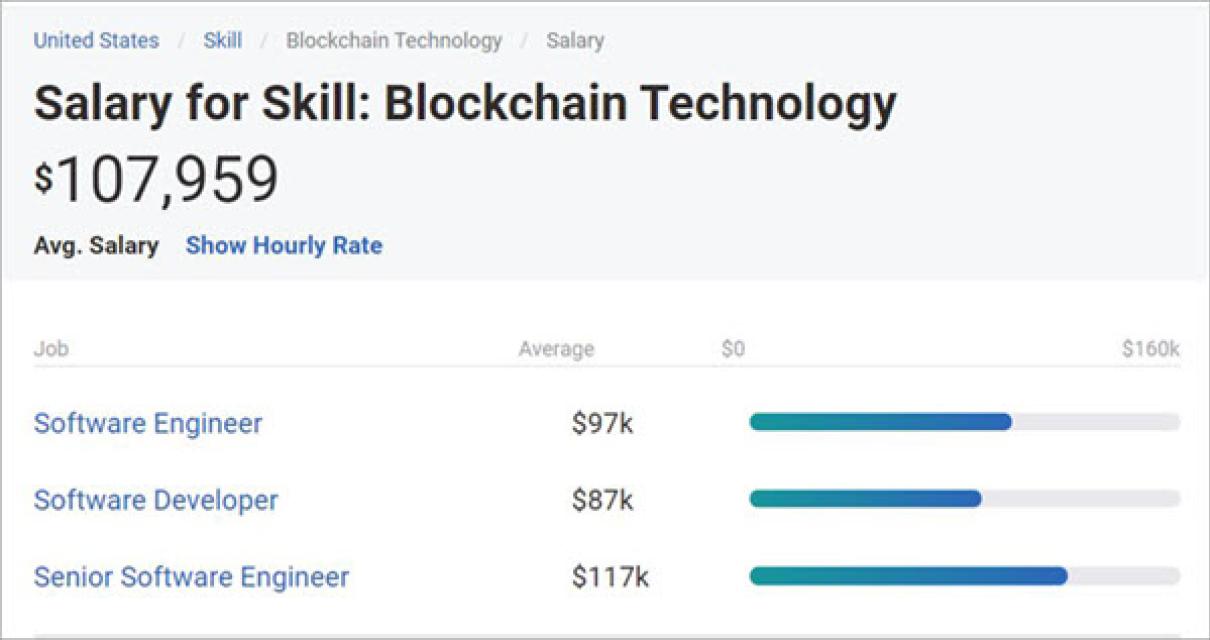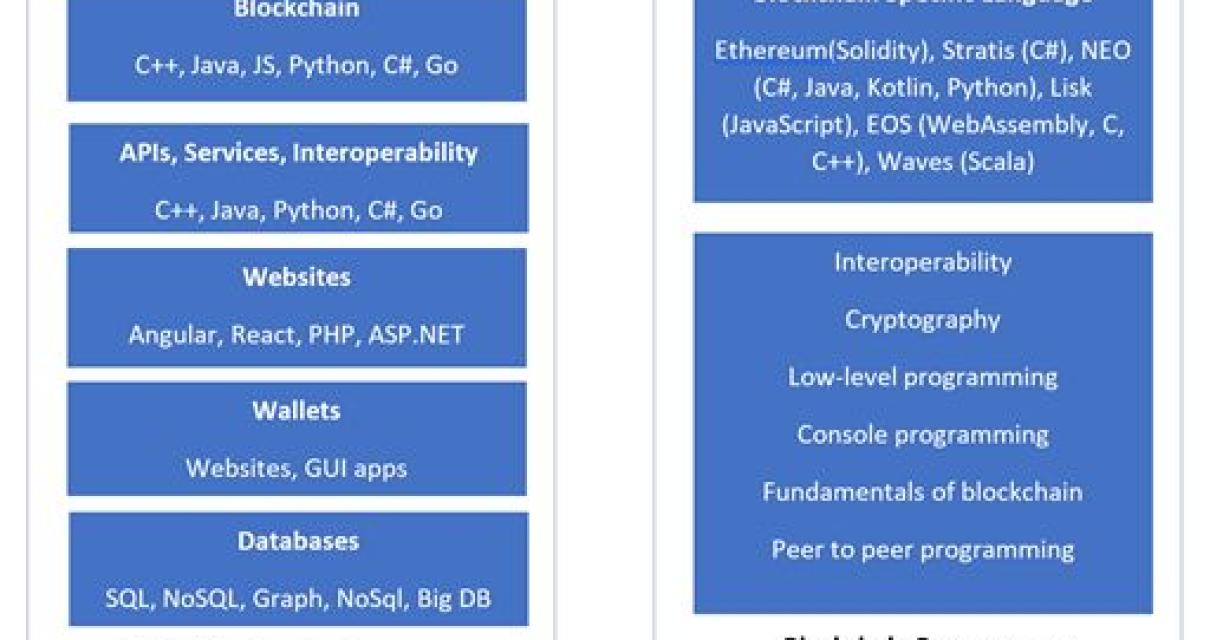How to Become a Blockchain Engineer: A Step-by-Step Guide
1. Understand the technology
One of the first things you'll need to do if you want to become a blockchain engineer is to understand the technology behind it. This means understanding how blockchain works, how it's different from other technologies, and what sorts of applications it can be used for.
2. Learn coding
Once you understand the basics of blockchain, you'll need to learn some coding. This will allow you to create your own applications on the blockchain, as well as modify existing applications.
3. Get experience
In order to become a blockchain engineer, you'll need some experience working with the technology. This means finding a way to get involved in projects that use blockchain technology. You can also look for internships or volunteer opportunities that will give you hands-on experience with the technology.
4. Pursue certification
If you want to be sure you have the skills necessary to become a blockchain engineer, you'll need to pursue certification. This can include courses that teach you all the basics of blockchain technology, as well as certification programs that will certify you as a true blockchain engineer.
From Blockchain Beginner to Engineer: Your Step-by-Step Guide
to Building a Blockchain Application
Blockchain technology is still in its early days, but it has the potential to revolutionize how we do business. If you're interested in learning more about blockchain, this guide is for you. In this guide, we'll walk you through the basics of blockchain technology, how to build a blockchain application, and some of the potential benefits.
Before we get started, it's important to understand that blockchain is not a single technology. It's a collection of technologies that work together to create a decentralized system. This means that there is no one entity that controls blockchain, and no one can tamper with the data.
Now let's get started!
What is Blockchain?
Simply put, blockchain is a database that allows people to share information without having to trust each other. Each block in the blockchain database is a record of a transaction, and it is constantly growing as new transactions are added.
How Does Blockchain Work?
To use blockchain, you first need to create a digital "wallet." This wallet is where you will store your bitcoin (or any other cryptocurrency) so that you can spend them. Next, you need to create a "blockchain application." This application will contain the code that helps you interact with the blockchain network.
To create a blockchain application, you will need to understand three core concepts: blocks, nodes, and transactions.
Blocks: A block is a record of a transaction, and it is added to the blockchain database as soon as it is verified by the network.
Nodes: A node is a computer that is responsible for verifying and adding new blocks to the blockchain database.
Transactions: A transaction is a record of a transfer of money or other assets between two people or companies.
How to Break Into the Blockchain Engineering Field
There is no one-size-fits-all answer to this question, as the best way to break into the blockchain engineering field will vary depending on your experience and qualifications. However, some tips on how to break into the blockchain engineering field include becoming a certified engineer, getting experience working with blockchain technology, and pursuing a degree in blockchain engineering.

So You Want to Be a Blockchain Engineer? Here's How to Get Started
First, you'll need to understand what a blockchain is. A blockchain is a digital ledger of all cryptocurrency transactions. It is decentralized, meaning there is no central authority that can control or change the information. Transactions are verified by network nodes through cryptography and recorded in a chronological order.
Next, you'll need to understand how a blockchain works. A blockchain consists of a network of computers that are linked together and share a common database. Each node stores a copy of the blockchain database and participates in verifying and recording transactions.
To become a blockchain engineer, you'll need to have a strong understanding of both how a blockchain works and how to build and deploy applications on top of it. You'll also need to have a keen eye for detail and be able to work independently.

How to Train to Be a Blockchain Engineer
Blockchain engineers are in high demand, and there are many ways to train for the role.
1. Get a degree in computer science or engineering.
2. Take courses in blockchain technology and cryptography.
3. Attend coding bootcamps that focus on blockchain technology.
4. Learn how to code in a specific blockchain platform.
5. Attend industry conferences that focus on blockchain technology.

The Ultimate Guide to Becoming a Blockchain Engineer
There’s a lot of buzz about blockchain these days, and it seems like the technology is on the rise. If you’re interested in learning more about this new technology and becoming a blockchain engineer, this guide is for you.
What is a blockchain?
Simply put, a blockchain is a digital ledger of all cryptocurrency transactions. This ledger is shared across a network of computers and is constantly growing as “completed” blocks are added to it with a new set of recordings. Each node in the network has a copy of the blockchain, and is able to verify the accuracy of the transactions in the ledger.
As of now, the most popular application of a blockchain is cryptocurrency transactions. However, the technology has many potential uses beyond just currency. For example, a blockchain could be used to track the movement of goods throughout the supply chain or to manage rights ownership for intellectual property.
What are the benefits of learning about blockchain?
There are many benefits to learning about blockchain technology. First and foremost, it’s a cutting-edge technology that could have a lot of impact on the way we live and work. Second, blockchain is incredibly secure. Once you understand how it works, you’ll be able to design and deploy secure blockchain applications yourself.
Finally, learning about blockchain can give you an edge when it comes to finding a job in the technology sector. Many companies are currently looking for blockchain engineers, and having knowledge of this technology will definitely give you an advantage.
If you’re interested in learning more about blockchain and becoming a blockchain engineer, this guide is for you. In it, we’ll cover everything you need to know about this exciting new technology, from what it is to how it works. We’ll also give you some tips on how to get started and some resources to help you along the way.
How to Make the Leap from Blockchain Enthusiast to Engineer
If you are interested in blockchain technology, but you don’t have any coding experience or you’re not sure where to start, you might want to consider studying engineering. Here are a few tips to make the leap from blockchain enthusiast to engineer:
1. Start with a foundation in computer science. Blockchain technology is based on computer science principles, so it makes sense to start by studying computer science fundamentals. This will give you the foundations you need to understand blockchain technology and build on it.
2. Learn how to code. If you want to become an engineer and work with blockchain technology, you’ll need to learn how to code. There are many different programming languages available, so find one that’s suitable for your skills and interests. Once you know how to code, you can start learning about blockchain technology and building your own projects.
3. Join a blockchain developer community. In order to keep up with the latest trends and developments in blockchain technology, it’s important to join a developer community. There, you can find like-minded people who can help you learn more about the technology and develop your skills.
4. Get involved with open-source projects. Open-source projects are a great way to learn about blockchain technology and build skills while also contributing to a community of developers. You can find many open-source projects related to blockchain technology on GitHub.
5. Attend conferences and meetups. Events like Bitcoin Miami and ConsenSys Enterprise Ethereum Alliance conferences offer opportunities to meet with experts in the field and learn more about blockchain technology.
If you want to become an engineer and work with blockchain technology, these tips should help you get started.